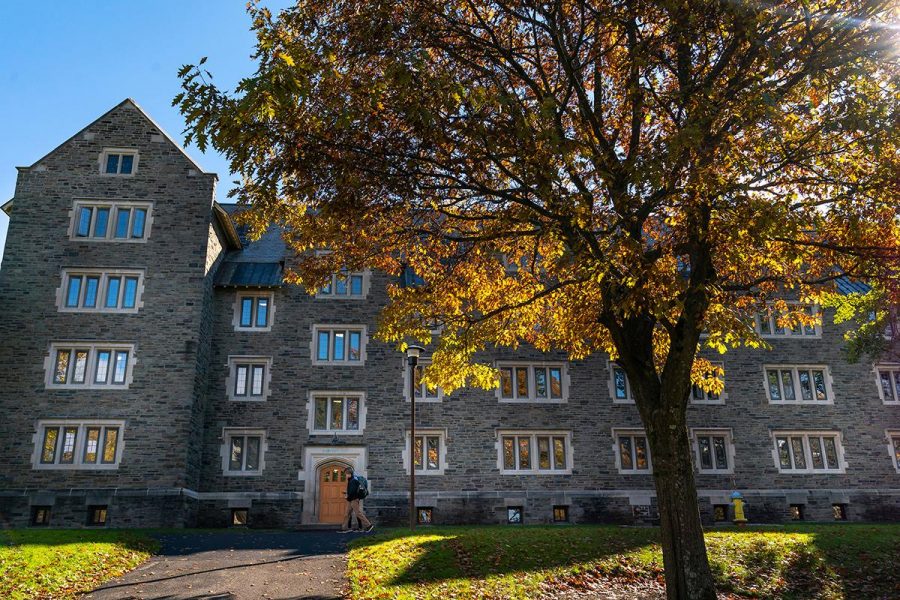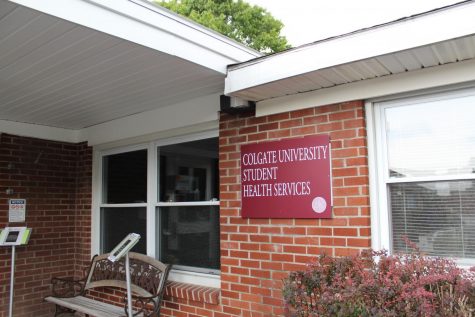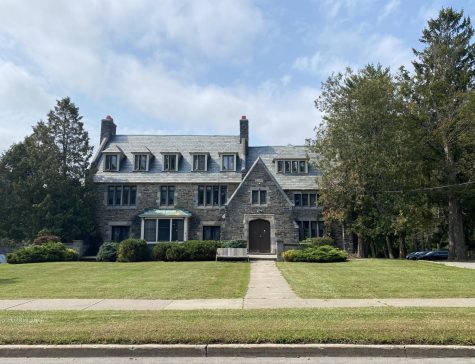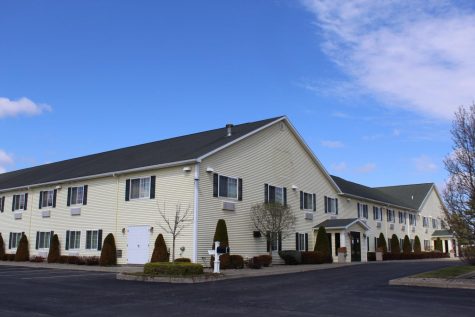Colgate Course Registration and Housing Selection Moved to Early June
Course registration and housing selection for the fall 2020 semester is delayed until June, pushing back the processes which both traditionally take place around mid-April of each year. In an email sent to students and faculty on April 9, Provost and Dean of Faculty Tracey Hucks and Vice President & Dean of the College Paul McLoughlin announced the suspension of these two processes until early June.
Hucks and McLoughlin expressed their hope for a return to Colgate’s traditional on-campus schooling for the upcoming fall semester, while recognizing the necessity for cautionary plans if disruptions continue in the time of the COVID-19 pandemic.
“Planning for the 2020-2021 academic year will require a spirit of creativity to ensure that Colgate returns to its residential liberal arts education as fully as possible, as soon as possible, while also foregrounding safety and responsibility to this community,” Hucks and McLoughlin said. “We are currently reviewing how best to achieve these ends.”
Hucks also noted that many housing selection processes for the upcoming year have already been decided and will not change.
Many students and faculty said they trust Colgate’s decision to delay and believe this delay will better prepare the campus for the uncertainties created by the COVID-19 pandemic.
Junior Johanne Castro expresses understanding of the delay.
“The world is in chaos and the last thing we want to think about is school. I think Colgate’s trying to make us have realistic expectations for next school year as they give themselves time to think of their plans for the future,” Castro said.
Junior Yejin Cha said she appreciates more time to plan for course registration and housing selection processes.
“Course registration and housing selection are especially stressful. It is much nicer now we don’t have to think about them during this already-stressful situation,” Cha said.
Associate Dean of Faculty for Curricular and Academic Affairs Douglas Johnson and Director of Residential Life Stacey Millard clarified that Colgate Departments and Programs, the Registrar Office and Residential Life were ready for registration to happen as originally scheduled. While hopeful for the next academic year being devoid of disruptions, Johnson and Millard explained in a joint statement that it is prudent to take time to develop contingency plans, thus the rescheduling of course and housing registration.
“Course registration and housing selection, in more usual times, happens when we already know, for the next academic year, which (and how many) faculty and students will be abroad and which (and how many) will be in Hamilton,” Johnson and Millard explained. “However, Colgate needs to be ready for the possibility that the COVID-19 pandemic will still be having effects on our community.”
With the decision to delay course registration, Johnson expressed the hope to minimize the negative impact on different Colgate populations.
“Our hope was that rescheduling registration would have minimal negative impact on most students, faculty, and staff, while allowing for us to do further planning for the fall, increasing the chances that the schedule, once posted and shared with students, can stay relatively constant,” Johnson said.
Millard explained that the delay in housing selection allows Residential Life as well as Colgate students to make more informed decisions about housing.
“The University has also delayed some of the remaining housing selection processes (the Inter Commons Transfer process, and the Commons and Junior/Senior Housing Lotteries) for the next academic year in order to accommodate the possibility of additional students in residence in this fall and/or a delay of some students’ arrival to campus,” Millard said.
“Running the remaining housing selection processes in June allows any students who no longer plan to participate in off-campus study a chance to select housing with their peers rather than be placed by Residential Life after these processes have already come to a close,” Millard further explained.
Department of Economics Chair Bob Turner also said he trusts Colgate’s decision to delay course registration.
“The delay makes all kinds of sense to me. The alternative would be to register for a course schedule that might have to end up being revised substantially, making everyone go through the process again,” Turner said.
Faculty members are expecting revisions to course offerings to accommodate the possibility of disruptions in the Fall 2020 semester.
“Departments and individual faculty members may have to do some significant revisions of their course offerings if we don’t start the fall semester on time and in person,” Turner said.
Some faculty and students have expressed feelings of uncertainty surrounding the pandemic and are waiting for more information about the delay in these processes.
Junior Isabel Wang expressed concerns and stress over the lack of information regarding fall courses.
“I don’t really know much about it. I just don’t like how things will be uncertain for so much longer,” Wang said. “I don’t even know what courses there are for me to choose. It’s stressing me out.”
Junior Karlos Acosta also expresses unease regarding the availability and quality of fall classes.
“What if a class I really want to take will simply be canceled? Not knowing that for sure causes a certain level of anxiety,” Acosta said. “And if we won’t be on campus on time for next semester, how will classes in the arts be conducted? Or the classes in other subjects that require you to have access to equipment?”
Acosta expressed a similar anxiety around uncertainties with housing.
“Will I even have my housing space secured since study abroad programs might be canceled? Is there a way to accommodate everyone if all of us will be on campus next semester?” Acosta questioned.
Acosta is not alone in his concerns about housing. Junior Zack Kraushaar said that he was unsure of the status of his off-campus housing.
“I don’t know about my off-campus housing,” Kraushaar said. “I think it counts as one of those completed housing decisions that won’t change, but I don’t know.”
Acosta said he hopes for a more active approach and better communication from the University.
“As a student, yes, I’m worried about the delay. It signals inaction as though we are just waiting to see what’s happening next,” Acosta said. “I wish there was a more active approach to engage with the issues around the pandemic, but I haven’t seen any active approaches or communication for a long time.”
However, Johnson and Millard said Colgate faculty and staff are taking action in working to formulate plans for the upcoming academic year.
“All of us want a return to our usual ways of teaching, learning, living and interacting with each other. And we are planning to be ready for that if it is possible,” Johnson and Millard said.
Hucks and McLoughlin said plans will come as soon as things become predictable.
“We will announce plans for each of these processes well in advance and as soon as it is practicable,” Hucks and McLoughlin said in their email to students.
Much remains unknown about the upcoming fall semester, as the country’s lockdowns begin to close out their second month and states look ahead to re-opening. Colgate’s dismissal of students came after Governor Cuomo dismissed students from the state’s public universities, and how Colgate starts in the fall hinges on how the governor transitions New York out of the lockdown. In his daily press briefing on April 22, Cuomo said, “We can’t be stupid.”
The governor also committed to opening the state by region in a press briefing in Buffalo on April 21.
“We’re going to make reopening decisions on a regional basis based on that region’s facts and circumstances,” Cuomo said.
This could pose further complications for Colgate’s return in the fall. Madison County holds one of the highest per capita infection rates for coronavirus in upstate New York, currently calculated by the New York Times to be 148.5 per 100,000 people. Reporting by Syracuse.com indicated the student populations of Colgate University, SUNY Morrisville and Cazenovia College could have played a role in the unusually high infection rate for the county.
The University has yet to make any announcements on further altering plans for the next academic year, and per its website as of publication time first-year students are set to arrive on Sunday, August 23.
Reporting contributed by Kate Hinsche.










